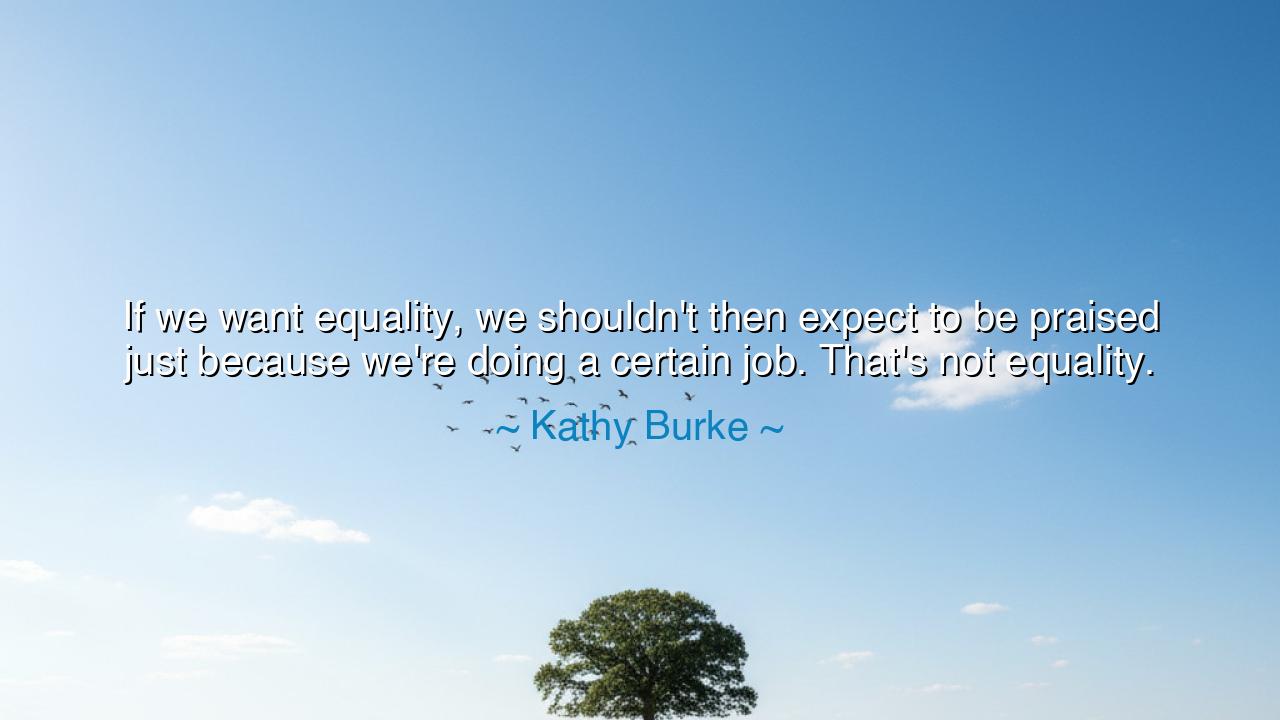
If we want equality, we shouldn't then expect to be praised just
If we want equality, we shouldn't then expect to be praised just because we're doing a certain job. That's not equality.






In the clear and forthright words of Kathy Burke, we find a truth both piercing and humble: “If we want equality, we shouldn’t then expect to be praised just because we’re doing a certain job. That’s not equality.” These words, though simple, strike at the very core of modern misunderstanding about what true equality means. It is not flattery, nor special favor, nor praise for doing what others do—it is balance, fairness, and the quiet dignity of being judged by the same measure. Burke’s wisdom reminds us that real equality is not about being elevated above others, but about walking beside them with neither pedestal nor chain.
The origin of this quote lies in Kathy Burke’s reflections on her career and her views on feminism and gender equity. As an acclaimed actress, writer, and director in the British arts, she has long stood as a voice of honesty and depth. Unlike those who seek the noise of recognition, Burke has often spoken for the silent virtues—self-respect, authenticity, and the rejection of false praise. In a world eager to decorate every act of representation with applause, she warns against confusing attention with equality. For to be praised merely for one’s gender, or for doing what any professional might, is not progress—it is patronization disguised as empowerment.
At the heart of her words lies a profound truth: equality thrives only when merit, not identity, becomes the measure of worth. The true victory of a just society is not that women, men, or any group are celebrated for doing their part, but that no one needs celebration for simply being allowed to do it. To demand praise for normality is to admit that normality has not yet been achieved. Burke’s insight cuts through the vanity of tokenism and calls us to something deeper: the kind of equality that no longer needs to announce itself, because it has become natural and unquestioned.
History, too, gives us its examples. Consider Amelia Earhart, the pioneering aviator who became the first woman to fly solo across the Atlantic. She did not seek applause for being a woman pilot; she sought only the skies. When asked about her place in history, she said she hoped that one day, people would stop qualifying achievements by gender—that there would be simply “pilots,” not “men” or “women” pilots. Her spirit mirrored Burke’s: both women understood that true equality is not performative—it is internalized. It is achieved not when society cheers every act by a woman, but when it ceases to notice that her act was exceptional at all.
Burke’s words also remind us of the subtle danger of reverse inequality—the temptation to seek superiority under the guise of justice. When those who once suffered injustice begin to demand not fairness but special treatment, they unknowingly repeat the error of their oppressors. To expect praise for ordinary deeds is to rebuild hierarchy under a different name. Thus, her statement is not cynical, but profoundly moral: she defends equality by preserving its purity. In her wisdom, she teaches that equality is not the destruction of difference, but the balance of dignity—a world where each may rise, not by favor, but by effort.
There is also humility in her message, for Burke knows that equality demands strength, not sensitivity. To live as equals, we must accept both criticism and challenge, just as freely as praise. In art, in work, in life, the truly equal soul does not crave applause for participation—it craves excellence. Equality, in her view, is the liberation from both oppression and indulgence. It is the freedom to fail, to learn, to rise, and to stand—not as a symbol, but as a human being.
Let this teaching, then, be carried forward as a torch for all who seek balance in the pursuit of justice: equality is not about elevation, but equilibrium. Do not demand praise for what is simply right; instead, demand fairness in the opportunity to do it. Let your work speak louder than your identity, and your integrity louder than your applause. The day you no longer need recognition to affirm your worth, that is the day equality will have truly been won.
And thus, in the enduring spirit of Kathy Burke, we are reminded that dignity needs no decoration. True equality is quiet, like truth itself—it does not shout, it does not seek reward. It simply is. To live by that truth is to become both humble and free—to walk through the world not asking to be praised for your presence, but striving to be respected for your contribution. For in that stillness of self-assurance lies the soul of all real justice.






AAdministratorAdministrator
Welcome, honored guests. Please leave a comment, we will respond soon